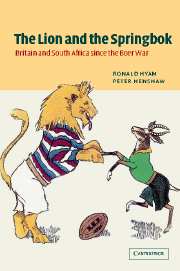Book contents
- Frontmatter
- Contents
- List of illustrations
- List of tables
- Preface
- Acknowledgements
- List of abbreviations
- 1 The uneasy special relationship: dynamics and divergencies
- 2 Breakdown: into war, 1895–1899
- 3 Post-war: the myth of magnanimity, 1905–1907
- 4 African interests and the South Africa Act, 1908–1910
- 5 ‘Greater South Africa’: the struggle for the High Commission Territories, 1910–1961
- 6 The economic dimension: South Africa and the sterling area, 1931–1961
- 7 Britain, the United Nations, and the ‘South African disputes’, 1946–1961
- 8 The political consequences of Seretse Khama and Ruth, 1948–1952
- 9 Containing Afrikanerdom: the geopolitical origins of the Central African Federation, 1948–1953
- 10 Strategy and the transfer of Simon's Town, 1948–1957
- 11 The parting of the ways: the departure of South Africa from the Commonwealth, 1951–1961
- 12 Enfeebled lion? How South Africans viewed Britain, 1945–1961
- 13 Springbok reviled: some British reactions to apartheid, 1948–1994
- Epilogue The relationship restored: the return of the new South Africa to the Commonwealth, 1994
- Select bibliography
- Index
3 - Post-war: the myth of magnanimity, 1905–1907
Published online by Cambridge University Press: 03 December 2009
- Frontmatter
- Contents
- List of illustrations
- List of tables
- Preface
- Acknowledgements
- List of abbreviations
- 1 The uneasy special relationship: dynamics and divergencies
- 2 Breakdown: into war, 1895–1899
- 3 Post-war: the myth of magnanimity, 1905–1907
- 4 African interests and the South Africa Act, 1908–1910
- 5 ‘Greater South Africa’: the struggle for the High Commission Territories, 1910–1961
- 6 The economic dimension: South Africa and the sterling area, 1931–1961
- 7 Britain, the United Nations, and the ‘South African disputes’, 1946–1961
- 8 The political consequences of Seretse Khama and Ruth, 1948–1952
- 9 Containing Afrikanerdom: the geopolitical origins of the Central African Federation, 1948–1953
- 10 Strategy and the transfer of Simon's Town, 1948–1957
- 11 The parting of the ways: the departure of South Africa from the Commonwealth, 1951–1961
- 12 Enfeebled lion? How South Africans viewed Britain, 1945–1961
- 13 Springbok reviled: some British reactions to apartheid, 1948–1994
- Epilogue The relationship restored: the return of the new South Africa to the Commonwealth, 1994
- Select bibliography
- Index
Summary
When the British Liberal government in 1906 granted self-government to the Transvaal it is highly unlikely that ministers were moved by genuine magnanimity towards the defeated Afrikaners. It is equally unlikely that the Afrikaner leaders before 1914 felt any genuine sense of reconciliation to the British empire. The Liberal government pretended to be acting magnanimously, while Jan Smuts and Louis Botha pretended to be pursuing a policy of conciliation. Both sides projected these attitudes for purely tactical reasons. Neither trusted the other, but each independently thought that they could attain their objectives by behaving as if they did; and yet out of this unpropitious situation of double deception a workable relationship was in fact hammered out. The key fact is that the Liberals never intended Botha and Smuts to form the first ministry when responsible government was established in the Transvaal, but, turning a failure of planning to good account, gave the clear impression that they had intended it; and they thus perhaps began the process of turning Smuts's marriage of convenience to the empire into a love relationship with the Commonwealth.
The idea of magnanimity has proved irresistibly attractive, even to those historians rightly sceptical of the influence of Smuts on this supposed British policy; and to advance such a set of contrary propositions is of course to challenge some of the most treasured orthodoxies enshrined both in imperial history and in the hagiographies of Smuts and the Liberal prime minister Sir Henry Campbell-Bannerman.
- Type
- Chapter
- Information
- The Lion and the SpringbokBritain and South Africa since the Boer War, pp. 57 - 75Publisher: Cambridge University PressPrint publication year: 2003



